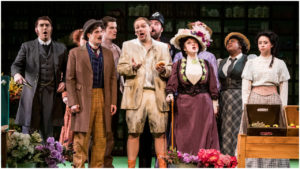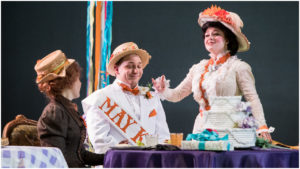
Curtis Institute of Music 2020 Review: Albert Herring
Students Ring in Springtime with Spirited Performance
By Logan Martell(Photo Credit: WMB Photo)
On March 5, 2020, the Curtis Institute of Music lifted the curtain on its run of Benjamin Britten’s “Albert Herring.” A springtime favorite, this opera explores themes of chastity and societal expectations through the eyes of a young greengrocer who finds himself at the center of Loxford’s May Day celebrations.
The work employs a number of fascinating musical conventions, ideas, and allusions to dramatic and comedic effect, with Thursday’s cast of students delivering a performance that was often exuberant and consistently delightful.
Building Confidence
In the title role, tenor Ethan Burck nicely traced the arc of Albert’s development into a more confident person. We first see hints of this after Sid and Nancy depart from his store, leaving him to tenderly reflect on his henpecked state. His yearning tinged his softly-rising phrase “And yet I’d really like to try that kind of life.”
While Burck visibly braced himself for the higher notes of this motif, one can also see an Albert choosing to take the first step forward in breaking from his shell. While the character is often nonplussed at the actions of the townsfolk, Burck’s expression adapted well to the situation; a humorous moment being when the committee arrives to announce his selection as May King, with a more poignant example being when he overhears Sid and Nancy talking about him; his face seemed to really be taking in what others thought of him, though it may not have been visible to all of the audience due to Burck’s placement on stage left, facing away from Sid and Nancy.
After coming home from the festivities, we see Albert drunkenly vent his feelings as they flowed between, whimsy, frustration, curiosity, and more. His entrance saw Burck stumble into the frame of the grocery door before he got a few hits back by repeatedly slamming it between phrases.
By the time Sid and Nancy departed on their date, Albert seemed to have sobered up from his bitterness, prior to the coin toss backed by a fateful orchestral texture that sent him into the next town for more spirits. After returning from his first bender, Albert stood up to the gathered cast with a bearing that felt at peace from his earlier inner turmoil.
In the role of Lady Billows, soprano Merissa Beddows displayed a breadth of vocal and dramatic technique as she fleshed out Loxford’s fearsome matriarch. The character’s upright, imperious nature heard expression through soaring, indignant tones from Beddows. When first announcing the prize for May Queen to the committee, her phrase “Must make virtue attractive, exciting, desirable for young people,” saw Beddows vocally plunge over an octave into what proved to be a captivating lower register. After berating the candidates for May Queen, the clock-strike from the orchestra is used to comedic effect as Beddows casually paused her scorn to take a pill.
With the festivities back on track in Act two, her earlier line of disappointment, “is this the town where I have lived and toiled,” returned joyfully transformed with a gorgeous opening that swelled with pride.
All these qualities were showcased with her aria “I’m full of happiness,” as she was swept away in her own fervor. Here, Beddows praised Albert with jubilant, rising phrases before crossing over to the children’s table to deliver warnings with frantic gravity; these volatile emotional states were brought to a huge, forte conclusion that drove home the character’s high-minded absurdity.

More Charming Execution
As Florence Pike, Anastasiia Sidorova dutifully carried out her lady’s orders with a warm but wearied smile. This expression, bolstered by the orchestral weight, really brought out her inner conflict as she bemoaned her many tasks.
While this softer approach made for a fresher take on the character, there were moments were her phrases felt lacking in emphasis, but this was only when she had to match Billows’ sheer intensity. Sidorova used a more appropriate bite when chastising Sid for his entrance in Act two, her phrase “Lateness of May Day is quite indefensible” carrying with a nice sense of urgency. Her gentler soprano nicely added to the texture of the ensemble
As Vicar Gedge, Andrew Moore employed a charming baritone to bring out the character’s allaying qualities. This is first heard when he joins Miss Wordworth in sweetly harmonizing about the pleasant weather, and returned when supporting Albert’s nomination for May King. As the orchestra flowed into a pious andante, Moore outlined his thoughts on virtue in a way that seemed to make it visible to himself, as well as draw in the reluctant Lady Billows with his sweetened high notes.
These qualities were also heard as he officiated the May Day ceremonies, starting with a honeyed, lyrical flourish as he asked Lady Billows to make her speech, and warmly called upon the others to present their gifts to Albert.
As Sid, Ben Schaefer made a mostly-trusty friend for Albert. Their initial exchanges saw him lightly stir up Albert for the allegretto, before Schaefer flowed into a more romantic sentiment “Girls mean Spring six times a week and twice on Sundays…” His lighthearted approach was capped with a falsetto “I love you” as he humorously squeezed Albert’s face. This tender, playful quality carried over well to his initial interactions with Nancy, with the two sharing a chemistry that kept them on the same page even at moments of conflict.
His entrance before the May Day celebration saw him ride his bike onstage; while he carried out the direction naturally, his placement towards the background, as well as the reduced support from his feet on the pedals, made his first line less audible. With the distinctive half-diminished chord marking the moment he spikes Albert’s lemonade, the cup’s placement on the table, from my particular angle, was hidden behind a cake which made the gesture more subtle. Later, after meeting up with Nancy, their passionate exchanges took on a lovely texture, backed by the rising strings and harp, as they indulged in affectionate, ascending roulades which echoed out with their departure.
Bubbly Demeanors
In the role of Miss Wordsworth, Lindsey Reynolds’ bubbly demeanor quickly endeared the audience, as heard from her first lines with Gedge and naming her choice for May Queen. Sweet and sensitive, Reynolds was briefly sent crying when Billows gravely referred to Loxford as a Sodom and Gomorrah.
Her beaming expressions returned not long after with Albert’s selection; the later entrance of the committee was humorously accented by Reynolds tossing confetti, much to Albert’s bewilderment. Her presentation of the gifts to Albert saw her stirred as she quickly wrapped her arms around him with a caressing touch before catching herself in the bout of passion. As Wordsworth lamented the missing Albert with Mrs. Herring, Nancy, and Gedge, Reynolds employed a crushed sonority as she joined their texture with a sonorous pianissimo to open the phrase “A grievous torment for a mother’s heart.”
As Superintendent Budd, Thomas Petrushka displayed a clear and resonant bass, able to open early ensemble sections and close them as well. An example of the latter being the lamentoso when the committee exhausted their list of candidates as he bleakly trailed off with the phrase “For human flesh is only grass and darkness has its uses.” His idea for a May King came nervously, but rose into a bolder suggestion by the end of the line.
In Act three, the effort to find Albert saw the frustrated Budd trade lower phrases with Sid, making for a moment of relative calm in during the search.
The set design, done by Julia Noulin-Merat, bore an earthy green theme in domestic settings like Lady Billows’ home and the Herrings’ store, lending a quaint, pastoral touch. The May Day celebrations of Act two featured a nice mix of white and purple décor, with vines of wisteria filling the space overhead.
Through the evening’s performance, the students of the Curtis Institue accomplished much in their handling of the works many intricacies, with hardly anyone feeling lost or drowned out in the dense musical textures of the ensemble numbers.
Their approach to the unfolding drama carried significant amounts of humor, without neglecting the more poignant moments which explore the development of Albert’s character. Thursday’s cast proved that there is still a lot to enjoy about Britten’s perennial work.



